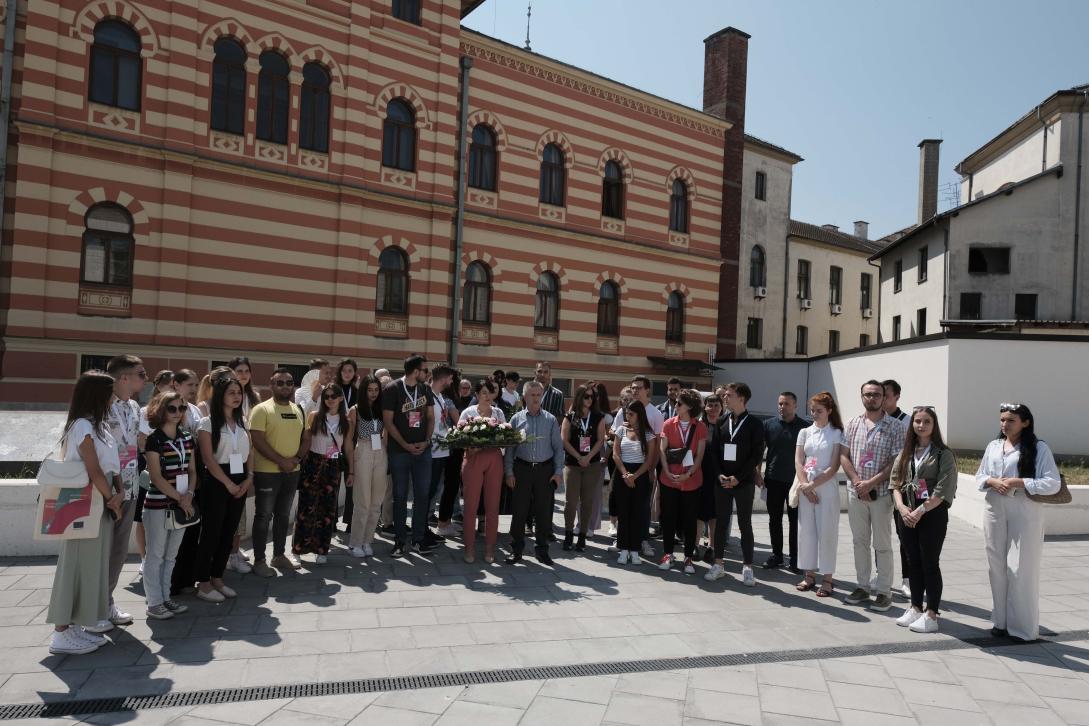„Our similarity is the way forward“ say young people from Western Balkans

The two-week 'State of Peace' Youth Academy has concluded with the message that the differences in the Western Balkan can be overcome through getting to know each other, socialising, and connecting with a common goal of moving towards a better, peaceful future. The first 'State of Peace' Youth Academy was organised by the European Union in Bosnia and Herzegovina in collaboration with the Post-Conflict Research Center from August 18 to 31 in Tuzla, Brčko, Sarajevo, and Vitez.
50 young people from Bosnia and Herzegovina, Croatia, Serbia, and Montenegro, learned about interreligious dialogue and tolerance, reconciliation, peace education, communication, activism, and human rights through art, socialising, and travel. Throughout the academy, they visited four places of worship from different religions and over ten different cultural and memorial institutions. They see the first 'State of Peace' Youth Academy as a unique educational platform for bridging and transcending national and religious differences and for preventing future conflicts.
Ferdinand Koenig, Head of Communications and Spokespereson at the EU Office in Bosnia and Herzegovina said, „I am delighted that we were able to provide support for an activity that brought young people from four different countries in the Western Balkans to Bosnia and Herzegovina. The EU's motto is 'Unity in Diversity' and we are sure that the friendships that have been made during the 'State of Peace Youth Academy' will last long into the future and continue to provide participants with new perspectives and challenge prejudices“.
Andrea Brzica from Zagreb explains, ''Discussing culture, our religions, beliefs, future perspective, and the perspective of the Western Balkans is something that has truly impressed me. Having such similar opinions, and at the same time, the opportunity to learn so much about the countries in the region through informal education seems incredible.'' She continued, ''For a better future and perspective, we need peace. It's easy to leave our communities or distance ourselves from history, but for a better future, we need peace, empathy, and understanding.''
For Amina Mujezinović from Novi Pazar, participating in the 'State of Peace' Youth Academy meant a lot because it reaffirmed her beliefs and provided answers to numerous questions that have shaped her as an individual, highlighting her multiculturalism and giving her the confidence to move forward. She expressed her gratitude to the organisers for this unique opportunity to learn together.
Darko Savović from Podgorica sees the academy as an opportunity for young people to come together, share ideas, engage in constructive dialogue, and move forward collectively. „If we are not united, we can achieve the minimum, but to truly succeed, we must do it together, regardless of our names, religious beliefs, nationalities, and how we feel. When we realise how similar we are, that is the right path forward. Some unnecessary things and trivial matters separate us.“
Ivan Komadan from Pale mentioned that at the Academy, he met many young people with whom he plans to stay in touch. He noted that the information about the crimes committed in the Kazani Pit, Ahmići, at the Osmica memorial, as well as at the War Childhood Museum, had a profound impact on him. Therefore, he is determined to share this information with his friends and fellow citizens because he believes that a lot of hatred is based on ignorance.
''I believe this is the best way to overcome issues of interethnic hatred. Through traveling and getting to know differences, many problems can be solved. The problem is that in rural areas, there is a higher percentage of hatred towards those who are different simply due to lack of knowledge,'' explained Komadan.
The 'State of Peace' Youth Academy met Vernes Babić's expectations, primarily because it helped him break down unconscious prejudices he had towards people from other countries with whom he had not previously had contact.
''This programme helped me break down those barriers. I was especially moved by visiting various memorials dedicated to civilian war victims that I didn't even know existed. It gave me a different perspective on the unnecessary brutality of war,'' said Babić. He emphasised that he was not aware of the crimes that occurred in the Kazani Pit in Sarajevo, nor the Osmica memorial.
Babić also mentioned that he hadn't had the opportunity to enter an Orthodox church before (Cathedral Church of the Nativity of the Theotokos), and he was very glad that he could do so at the Academy. He learned how Orthodox believers make the sign of the cross, and perform other religious rituals.
When it comes to the educational part of the Academy, Nikola Pavlović from Belgrade found the most significant part to be learning about war crimes. He noted that it was sometimes difficult to hear about the committed crimes, especially those that had children as victims, but that this type of learning motivates him to work on preventing crimes in the future.
''I've learned a lot about Islam, visited a mosque (Gazi Husrev-beg Mosque), and got acquainted with Bosnian culture and art. It means a lot to me,'' added Pavlović, emphasizing that he is very pleased that young people from the region participated in the Academy because everyone connected, went out together, socialised, and new friendships and loves were born.
